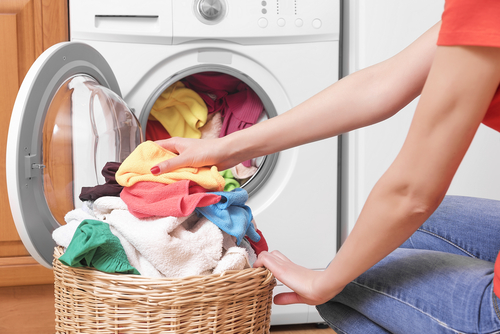Living in a rental home can get quite pricey, especially as costs rise everywhere. That said, if you pay for utilities in your rental home, your monthly expenses may be even higher. Although you can’t do much about your monthly rent amount, you can take steps to lower your utility bills. So, read along to learn some of the best ways to lower utility bills in a rental and manage your monthly payments.
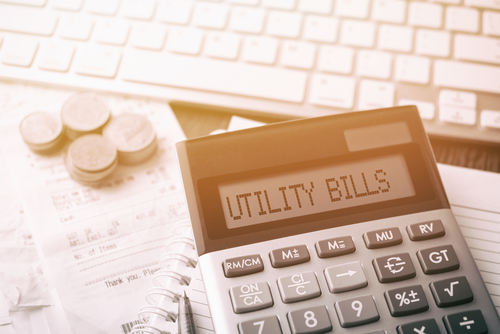
Contents of This Article:
- Who Pays for Utilities in a Rental?
- How Much Do Utilities Cost Each Month?
- How to Lower Utility Bills in a Rental Home
- Managing Your Utility Bills at a Rental
- Ask Your Property Manager How You Can Save
Who Pays for Utilities in a Rental?
When it comes to who’s responsible for utility payments in a rental, it ultimately depends on the landlord. When you apply for a rental property, it’s essential to know whether utilities are included in the monthly rent or if you must pay them separately.
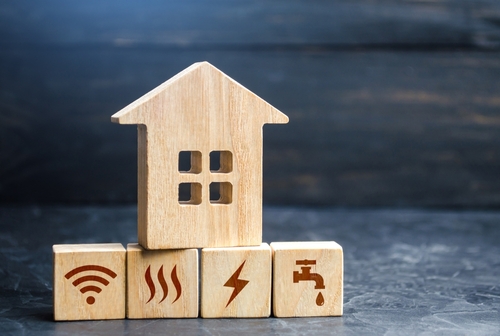
Sometimes, landlords include utilities in the monthly rent. That means they’re paying each utility and charging you one simple payment. However, some landlords charge for rent, plus utilities, which you pay separately.
Utilities generally include water, electricity, heat, internet, trash collection, and more, depending on the rental. However, landlords usually do not cover internet and cable, even if they state that all utilities are included. Therefore, connecting with your landlord or Northern Virginia property management company is essential to see which bills you’re responsible for.
If you’re paying utilities for a rental, it’s crucial to budget correctly to cover them. Additionally, you’re usually responsible for setting them up with each utility company. Next, we’ll review how much utilities generally cost in a rental home.
How Much Do Utilities Cost Each Month?
Utility costs differ depending on location. For instance, in Northern Virginia, the average monthly total for all utilities is just above $400. However, utility bills fluctuate from month to month and ultimately depend on your usage.
Virginia utility costs are lower than the national average, so you can expect to pay less for your monthly utilities than in other states. According to Virginia Public Utilities, here are some of the residential utility rates in 2023.
- Electric: $0.079 per kWh
- Water: $3.75 per 100 cubic ft.
- Natural Gas: $0.79 per 100 cubic ft.
- Sewer: $9.30 per unit of water used
- Garbage: $9.83 per month
Regarding cable and internet bills, it depends on your provider. To get the lowest rates, check out different internet companies near you and compare rates. Next, we’ll go over how to lower utility bills in a rental home.
How to Lower Utility Bills in a Rental Home
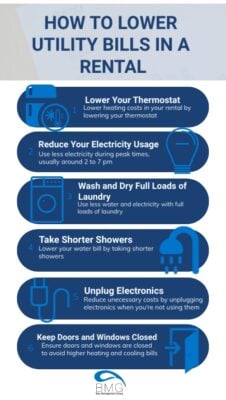
Paying for utilities in a rental on top of your typical monthly rent payment can quickly add up. However, you can take several small steps to lower utility bills in a rental home. Here are some of the easiest, most common ways to reduce utility costs.
- Lower Your Thermostat
- Reduce Your Electricity Usage at Peak Times
- Wash and Dry Full Loads of Laundry
- Take Shorter Showers
- Unplug Electronics
- Keep Doors and Windows Closed
Lower Your Thermostat
One of the most obvious and easy ways to lower your heating costs is lowering your thermostat. Lowering the temperature of your apartment or rental home a few degrees can save around 5% on heating expenses. However, while you may not notice the difference in comfort, you’ll notice the difference in your utility payments.
A smart thermostat is one way to check your rental’s temperature. Smart thermostats have timers and simple controls you can use from your smartphone. So, consider setting your thermostat lower than usual or off entirely when you’re not home or sleeping at night.
Reduce Your Electricity Usage at Peak Times
Most electric companies charge more for their services at peak times throughout the day. While each company has its peak hours, they’re usually from around 2 pm to 7 pm, Monday through Friday. During these times, the electricity rate is significantly higher than the “off-peak” rate.
While it’s not always possible, try to avoid using energy-intensive appliances during peak hours. Some energy-intensive appliances include your washing machine, dishwasher, or air conditioner.
Wash and Dry Full Loads of Laundry
When washing and drying clothes, avoid wasting energy and save up your laundry until you have enough for a full load. Washing multiple small loads of laundry sucks up a lot of electricity and water, which could contribute to your utility bills.
Additionally, if you want to save even more, consider drying clothes on a clothesline in your backyard or patio. That way, you don’t have to use the dryer, which can save your electric bill. Just check your local laws in advance to ensure it’s allowed in your neighborhood.
Take Shorter Showers
Another simple habit that you can quickly implement is taking shorter showers. After all, the longer your shower, the more water you use, and the higher your water bill can be. As such, try to cut down your shower by a few minutes each time, and you’ll notice a huge difference in your water bill.
Another way to save water while showering is by investing in a water-saving showerhead. Low-flow showerheads use significantly less water than your typical showerhead, making cutting back on utility costs easy.
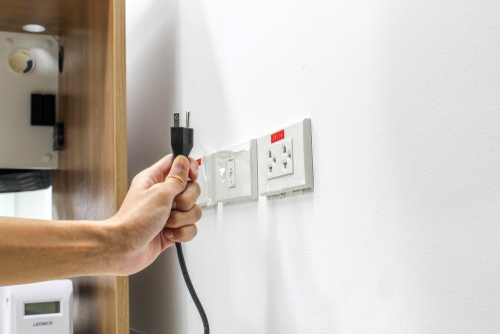
Unplug Electronics
Even when you’re not using electronics, they still use power if they’re plugged in. As such, try to make it a habit to unplug your electronic devices when you’re done using them. This includes your TV, lamps, small kitchen appliances, computer, etc. Ultimately, unplugging these devices when you’re not home or not using them can save your electric bill.
Keep Doors and Windows Closed
Another obvious solution to lowering your monthly utility bills is keeping your doors and windows closed when they’re not in use. You’ll want to address and seal leaky areas if you have drafty windows or doors. One simple way to do this is with door draft stoppers and window plastic wrap.
Additionally, if you have a fireplace, it’s essential to close the damper to ensure it’s sealed and no air is coming in. If you have a garage or basement, check all the doors and windows to avoid letting cold air in.
Managing Your Utility Bills at a Rental
If your landlord is responsible for the utility bills at your rental property, you don’t have much to worry about. You simply pay your monthly rent, and they use a portion to pay for the utilities.
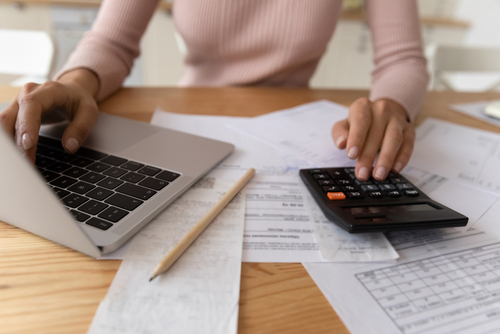
However, setting up your utilities for your rental can be confusing. While it depends on your lease term, location, and type of rental, you’ll want to talk with local companies to set up each necessary utility.
Additionally, keeping up with monthly payments is crucial if you’re responsible for your rental utility bills. If your bills come in at different times each month, losing track of due dates is easy. So, devise an easy-to-follow payment schedule, or enroll in automatic payments to ensure you don’t miss any.
Ask Your Property Manager How You Can Save
If you are surprised by your utility bills each month, you’ll want to take a few steps to lower them. With lower utility bills in your rental, you have more money for other wants or needs. However, if you’re having trouble saving on utility costs, ask your property manager for more tips on lowering your bills.
Need More Advice? contact us today!
Bay Property Management Group is a full-service company willing to help tenants and landlords with any questions about a rental. Whether you need help finding a new rental, want to renew your lease, or have questions about the property, BMG can help.
On the other hand, if you own rental properties and need help managing them, that’s where we excel! Contact Bay Property Management Group today to learn more about our comprehensive rental management services.

